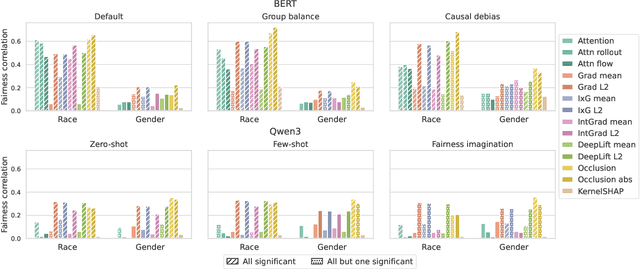Soyoung Oh
Bridging Fairness and Explainability: Can Input-Based Explanations Promote Fairness in Hate Speech Detection?
Sep 26, 2025



Abstract:Natural language processing (NLP) models often replicate or amplify social bias from training data, raising concerns about fairness. At the same time, their black-box nature makes it difficult for users to recognize biased predictions and for developers to effectively mitigate them. While some studies suggest that input-based explanations can help detect and mitigate bias, others question their reliability in ensuring fairness. Existing research on explainability in fair NLP has been predominantly qualitative, with limited large-scale quantitative analysis. In this work, we conduct the first systematic study of the relationship between explainability and fairness in hate speech detection, focusing on both encoder- and decoder-only models. We examine three key dimensions: (1) identifying biased predictions, (2) selecting fair models, and (3) mitigating bias during model training. Our findings show that input-based explanations can effectively detect biased predictions and serve as useful supervision for reducing bias during training, but they are unreliable for selecting fair models among candidates.
PeaCoK: Persona Commonsense Knowledge for Consistent and Engaging Narratives
May 03, 2023



Abstract:Sustaining coherent and engaging narratives requires dialogue or storytelling agents to understand how the personas of speakers or listeners ground the narrative. Specifically, these agents must infer personas of their listeners to produce statements that cater to their interests. They must also learn to maintain consistent speaker personas for themselves throughout the narrative, so that their counterparts feel involved in a realistic conversation or story. However, personas are diverse and complex: they entail large quantities of rich interconnected world knowledge that is challenging to robustly represent in general narrative systems (e.g., a singer is good at singing, and may have attended conservatoire). In this work, we construct a new large-scale persona commonsense knowledge graph, PeaCoK, containing ~100K human-validated persona facts. Our knowledge graph schematizes five dimensions of persona knowledge identified in previous studies of human interactive behaviours, and distils facts in this schema from both existing commonsense knowledge graphs and large-scale pretrained language models. Our analysis indicates that PeaCoK contains rich and precise world persona inferences that help downstream systems generate more consistent and engaging narratives.
 Add to Chrome
Add to Chrome Add to Firefox
Add to Firefox Add to Edge
Add to Edge